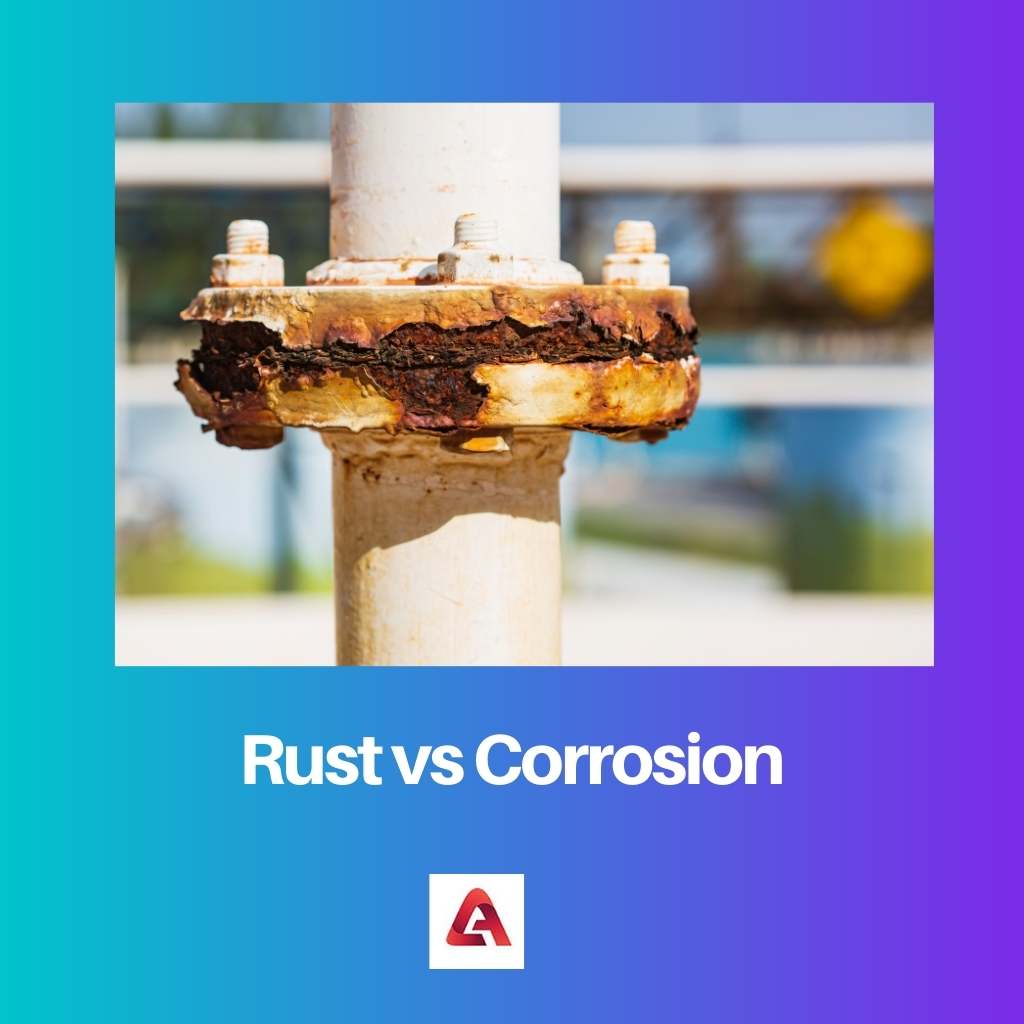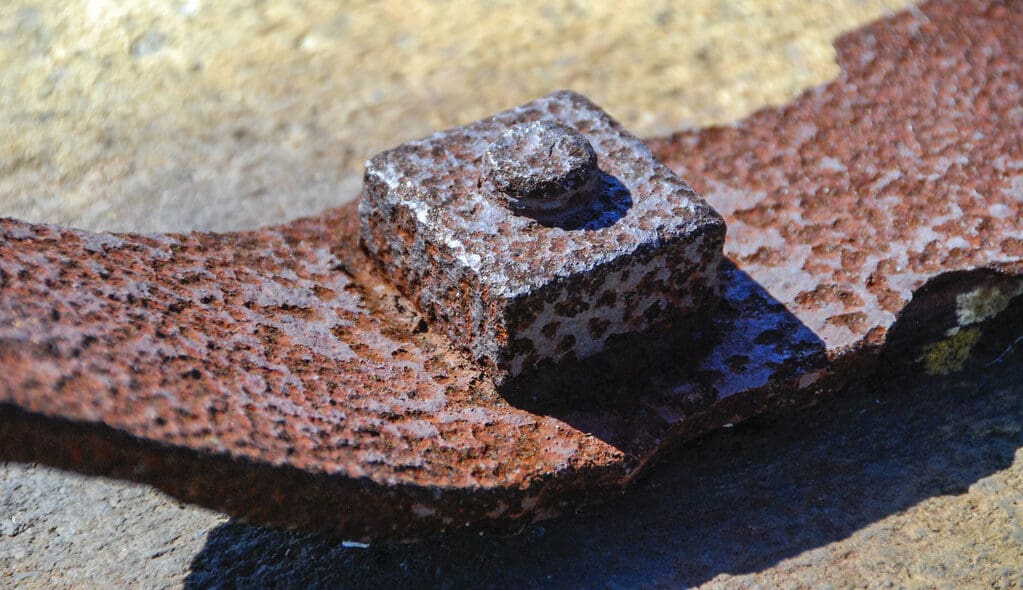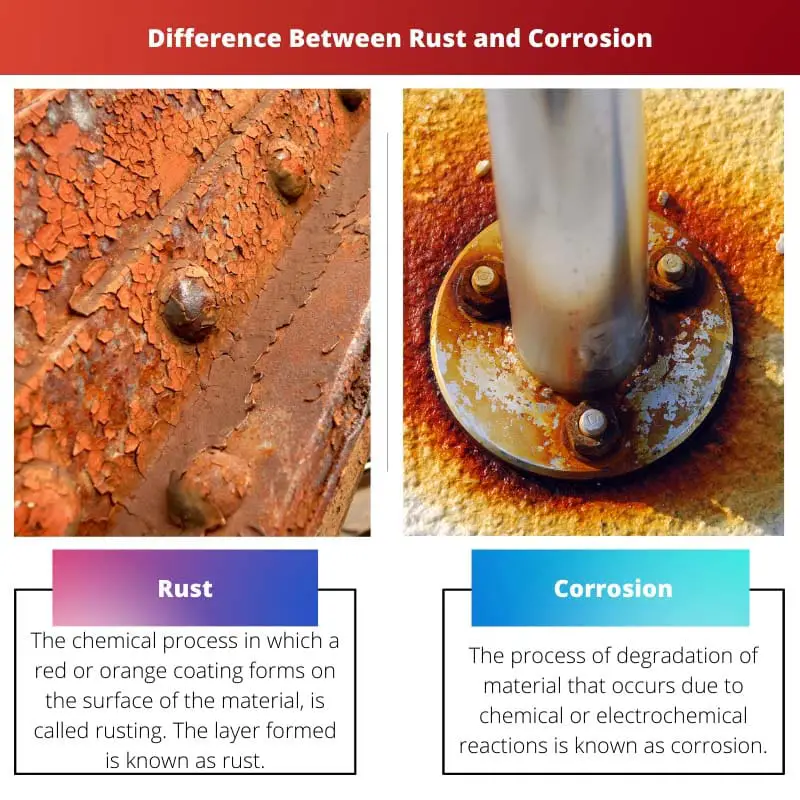Rusting and corrosion are two very common processes that we come across in our everyday life. We already have the knowledge that they disintegrate the materials, and focusing on this, we randomly use these terms without knowing the difference.
Based on the destruction they cause, sometimes people find it confusing to differentiate between the two. The two terms might give us the same idea while they are not synonyms for one another.
There are indeed some major differences between the two. Hence we need to learn and understand the two processes individually.
Key Takeaways
- Rust is a type of corrosion that occurs only on iron and steel surfaces.
- Corrosion is a process of deterioration of materials caused by chemical reactions with their environment.
- Rust weakens the metal surface, while corrosion can affect any surface, including plastic, concrete, and glass.
Rust vs Corrosion
Rust is a reddish-brown oxide that forms on iron or steel when it reacts with oxygen and moisture in the air. It is a common problem in outdoor metal structures, such as bridges, and vehicles. Corrosion is the deterioration of any material due to chemical reactions with its environment, leading to structural failures or other problems.

Rusting can take place only on metal surfaces, iron to be specified. It also affects alloys of iron, such as steel.
This happens when iron substances come in contact with both air and moisture. It forms iron oxides as its end product.
It is a type of corrosion rather than the most common type. On the other hand, corrosion can take place on both metallic and non-metallic surfaces.
It forms metallic oxides, hydroxides, or salts of the substances as its end products. This chemical reaction destroys the material or makes it weaker.
Comparison Table
| Parameters of Difference | Rust | Corrosion |
|---|---|---|
| Definition | The chemical process in which a red or orange coating forms on the surface of the material is called rusting. The layer formed is known as rust. | The process of degradation of material that occurs due to chemical or electrochemical reactions is known as corrosion. |
| Surface | It only occurs on the surface of iron or alloys of iron. | It may occur on various surfaces such as metals, wood, etc. |
| Cause | It mainly occurs when some metal is exposed to air and moisture. | It mainly takes place when the substances are exposed to the air or some chemicals. |
| Products | It results in the formation of metal oxides or salts. | It results in the formation of iron oxides. |
| Substances | It can affect substances like polymers or ceramics. | It affects none but iron substances or their alloys. |
What is Rust?
To be specific, rusting is the oxidation of iron and its alloys. It affects the material’s properties, including physical appearance, structure, and strength.
Once a metal starts to rust, it eventually spreads, making it weaker. It further makes the substances unusable. It occurs when metals are exposed to the environment without any protection or preventive measures.
Both air and moisture are the causative agents. When a metallic surface comes in contact with these two, it forms metallic oxides, which in turn deteriorates the substance.
By far, water is known to be the most common agent. Prolonged exposure to water causes the metallic ions to bond with the oxygen present in water readily.
This, in turn, leads to the formation of iron oxides on the surface. It makes the material weak by forming a red crust due to the presence of iron oxide.
Rusting is a type of corrosion, and thus it has a specific range of materials to affect. Chlorine water is proven to cause rusting at a faster rate.
Along with the formation of oxides, the chlorine ion bonds with the saltwater. If not treated immediately, the destruction happens at quite a faster rate.

What is Corrosion?
Corrosion affects a wide range of materials since it includes both metallic and non-metallic substances. It eventually results in the formation of metallic oxides or salt of the respective material.
Every substance has different kinds of elements in it. Thus their resistance varies too.
Some of them might be resistant to corrosion, while others can be prone to it. It depends on the original property of the material.
A number of external factors, such as strong acids, bases, water, and chemicals, can be the causative agent for corrosion. Even gaseous substances like ammonia gas or acid vapours might lead to the corrosion of various materials.
Some definite chemical reaction causes corrosion. They are corrosive in nature and include strong acids or bases like HCL and NaOH.
These types of chemicals are termed corrosive chemicals and can cause

Main Differences Between Rust and Corrosion
- Rusting affects only metals. It mainly includes iron and its alloys, such as steel. Corrosion affects both metals and non-metals. It might even include wood or skin.
- Coating the surface of materials is the most effective way to prevent corrosion. In the case of rust, the most effective preventive measure is galvanization. Also, keeping them with minimum moisture contact is important.
- In rust, the end product which forms is red or orange, whereas, in the case of corrosion, it forms a variety of colours ranging from blue to green.
- The causative agent for rusting is air and moisture. Rusting occurs only when the metal surface is exposed to both air and moisture. On the other hand, corrosion might take place either due to air or moisture or both.
- Rusting does not require any particular chemical reaction to take place but can be accelerated by one. However, in the case of corrosion, there is always some strong corrosive reaction taking place. It might be some strong acids or bases.

- https://www.sciencedirect.com/science/article/pii/S0959652616319047
- https://www.jstage.jst.go.jp/article/matertrans/46/1/46_1_136/_article/-char/ja/
Last Updated : 11 June, 2023

Piyush Yadav has spent the past 25 years working as a physicist in the local community. He is a physicist passionate about making science more accessible to our readers. He holds a BSc in Natural Sciences and Post Graduate Diploma in Environmental Science. You can read more about him on his bio page.

The explanation of rust and corrosion in this article is thorough and thought-provoking. It’s essential information for those dealing with metal and non-metal substances.
The article is quite enlightening, but I find the distinction between rust and corrosion to be somewhat trivial. At the end of the day, both processes lead to material deterioration, which is concerning.
Your perspective is interesting, Fhall. However, understanding the nuances between rust and corrosion can be beneficial in developing effective preventative measures.
The article provides a comprehensive understanding of rust and corrosion. The detailed descriptions and examples help clarify the differences between these two processes.
I couldn’t agree more, Murphy Summer. The comparison has been elucidated effectively in this article.
While the article provides detailed information, the distinction between rust and corrosion seems somewhat pedantic. Both processes result in material damage, and that’s what’s essential to address.
I understand your point, Ydavies. However, precise terminology and understanding specific characteristics can lead to more effective solutions and treatments.
Very informative article! I appreciate the detailed explanation and comparison between rust and corrosion. It’s crucial to understand the differences and take preventive measures.
I completely agree, Luke46. This article is a great source of knowledge on the topic.
The facts presented in this article are quite intriguing. The detailed comparison table provides a clear understanding of the differences between rust and corrosion, which is valuable in various industries.
Absolutely, Ethan63. The article brings clarity to an misunderstood subject.
This article is well-researched and presents a comprehensive comparison between rust and corrosion. It’s crucial for individuals to be aware of these processes, particularly when dealing with metal surfaces.
Agreed, Cmarshall. Knowledge about rust and corrosion is valuable, especially for those involved in engineering and construction.
This article is enlightening and comprehensive. The distinction between rust and corrosion is vital for understanding the processes that lead to material degradation.